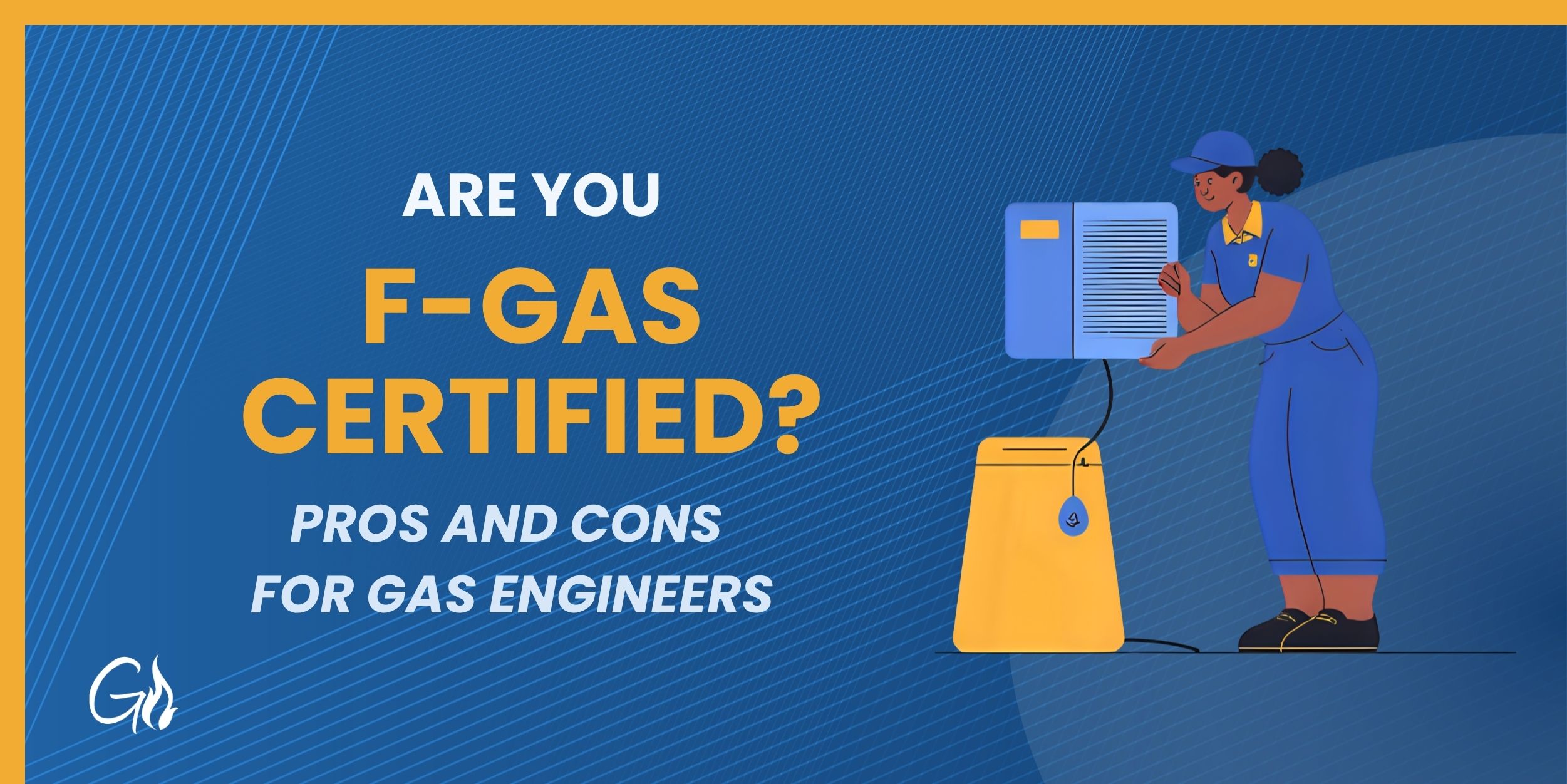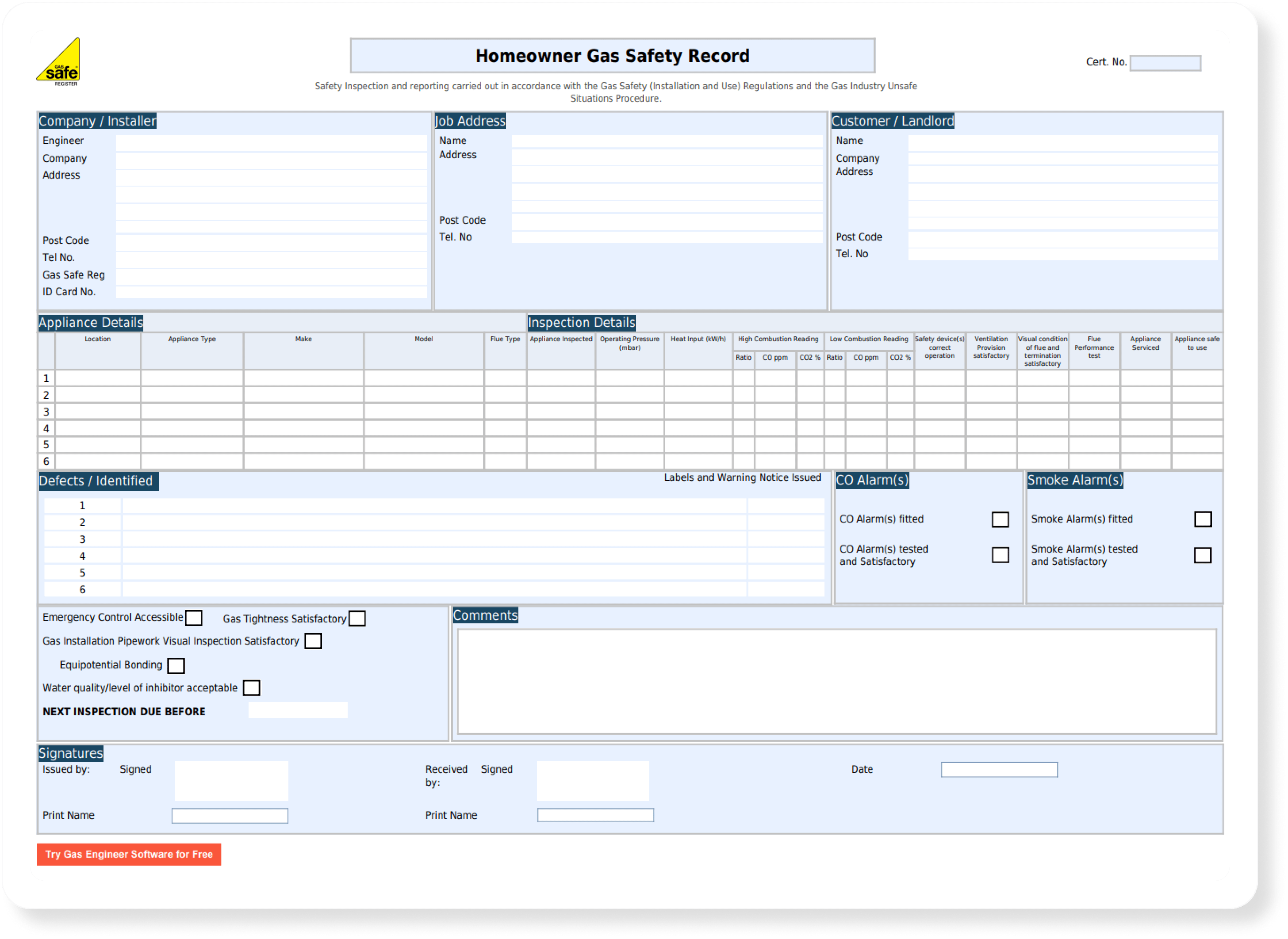Should You Get F-Gas Certified as a Gas Engineer?

Only about 5% of UK homes have air conditioning installed… but this could all change with hotter summers and a reported 63% increase in installations this past year.
But here’s the catch: there isn’t a proportional increase in the amount of certified F-gas installers.
For heating engineers, getting F-Gas certified presents a new avenue for work, especially during the summer when fewer customers are ringing to get their boilers checked.
So is it worth getting F-Gas certified?
Let’s break it down.
What Is F-Gas Certification?
F-Gas certification allows engineers to safely work with fluorinated gases, which are used in air conditioning, refrigeration, and some heat pump systems.
These gases are tightly regulated because of their environmental impact — if released into the atmosphere, they contribute to global warming. Anyone installing, servicing, or recovering refrigerants must hold an F-Gas qualification.
In simple terms, F-Gas proves you can handle refrigerants safely and legally.
What Is F-Gas For?
F-Gas certification is for anyone working with systems that contain refrigerant circuits — like:
- Air conditioning units
- Split heat pumps
- Refrigeration systems
If your day-to-day work doesn’t involve refrigerant handling, you probably don’t need it. But if you’re thinking about adding cooling or heat pump installations to your service offering, keep reading.

Do Gas Engineers Need F-Gas Certification?
The short answer: it depends on what you work on.
- Standard boilers and heating systems: You don’t need F-Gas.
- Air conditioning systems: You do need F-Gas.
- Heat pumps: Sometimes. Monobloc systems do not require F-Gas, split systems do.
Under UK law (based on the retained EU Regulation 517/2014), anyone who installs or services systems containing refrigerants must be F-Gas certified. That includes air conditioning and split heat pumps.
So before you book a course, the real question is — what kind of systems are you planning to work on?
Should Gas Engineers Get F-Gas Certified?
Not every gas engineer needs F-Gas, but if you’re looking to diversify your services, it could be a smart move.
Here’s what to consider.
Pros of Getting F-Gas Certified
- Rising demand for cooling systems: More homeowners are adding air conditioning to home offices, loft conversions, and conservatories — and that demand keeps growing.
- Expanded service range: F-Gas opens the door to installing and maintaining both AC units and split heat pump systems, giving you more ways to make money.
- More work during quieter summers: Boiler jobs tend to slow down in summer, but AC installations and maintenance can keep your schedule full.
- Future-proofing your skills: As low-carbon heating options grow, F-Gas gives you a head start in adapting to the changing energy landscape.
Things to Weigh Up
- The course takes a few days and usually costs between £600–£1,000.
- If you are only planning to install monobloc heat pump systems, F-Gas certification is not necessary.
- You’ll need a few specialist tools and gauges.
- There’s some competition from dedicated AC installers — but your heating experience gives you a strong technical foundation.
In short, if you want to expand your offering and make your business more resilient, it’s a worthwhile investment.
Thinking about F-Gas certification?
Now’s the best time — training’s on discount! Become a Gas Engineer Software user and get a 10% discount on any gas course from Logic4Training.
How to Get F-Gas Qualified
To become F-Gas certified, you’ll need to complete an accredited course through a provider such as Logic4Training. There are two main options:
1. Basic F-Gas Refrigeration Training Course
- Duration: 3 days
- Cost: £495 + VAT
- Ideal if you’re new to refrigeration and want to build a foundation before moving on to the full F-Gas qualification.
Covers the fundamentals of refrigeration and F-Gas regulations — perfect for heating engineers making their first step into cooling work.
2. Level 3 RQF F-Gas Training (Category 1 Certification)
- Duration: Typically 5 days (with a 3-day fast-track option if you already have refrigeration experience)
- Cost: From £1,095 + VAT
- Outcome: This is the full qualification most gas engineers go for. It’s accredited by LCL Awards and qualifies you to:
- Install, service, maintain, and recover refrigerants independently
- Work on systems of any size or type
What it covers:
- Refrigeration theory
- Leak testing, recovery, and charging
- Environmental legislation and safe handling practices
- Practical assessments and written exams
Once you pass, you’ll need to register under an approved F-Gas company certification scheme — for example, Refcom, BESA, or Quidos.
This registration is what legally allows you (or your business) to handle refrigerants on-site.
F-Gas and Heat Pumps: When (and When Not) You Need It
This is where things often get mixed up — not all heat pumps require F-Gas certification.
Here’s the difference:
Monobloc Heat Pumps
- These are sealed, pre-charged systems, meaning you never handle refrigerant gases directly.
- You do not need F-Gas to install them.
- Most domestic heat pumps installed in the UK are monobloc units.
Split Heat Pumps
- These have indoor and outdoor units connected by refrigerant pipework that must be joined and sealed on-site.
- You do need F-Gas certification for this, as it involves working directly with refrigerants.
If you’re fitting monobloc systems, your Gas Safe registration and manufacturer training are enough. But if you want to handle split systems or AC units, that’s where F-Gas becomes essential.
Who Should Consider Getting F-Gas Certified
So, should you go for it?
F-Gas certification is a smart move if:
- You want to install or maintain air conditioning units or split heat pumps.
- You’re looking to add more summer work to your schedule.
- You plan to grow your business into a full-service heating and cooling provider.
- You want to stay ahead as the industry shifts toward low-carbon systems.
You can skip it for now if:
- You only work on gas boilers, domestic heating, and monobloc heat pumps.
- You prefer to focus on one area of expertise rather than expanding into cooling.
FAQs
Do I need F-Gas as a gas engineer?
Only if you’re working on systems that contain refrigerant gases — like air conditioning or split heat pumps.
Do I have to be F-Gas certified to fit an Air Source Heat Pump?
Not always. If you’re installing a monobloc heat pump, you don’t need F-Gas certification because the refrigerant circuit is sealed and pre-charged by the manufacturer.
However, split systems require on-site refrigerant connections, so they must be installed (or commissioned) by an F-Gas-certified engineer.
What is F-Gas for?
It’s required for anyone handling refrigerants in air conditioning, refrigeration, and some heat pump systems.
Can I install heat pumps without F-Gas?
Yes. Most domestic monobloc systems don’t require it because they’re sealed and pre-charged.
Is F-Gas hard to get?
Not at all. If you’re already Gas Safe and technically minded, most of the course will feel familiar.
The Bottom Line
Becoming F-Gas certified isn’t essential for every gas engineer — but it can open the door to new work, smoother summers, and future-ready skills.
If you’re looking to expand into air conditioning or split heat pumps, it’s a qualification that can pay for itself quickly.
But if you’re happy focusing on gas and heating, you can keep doing what you do best — no extra certification needed.

